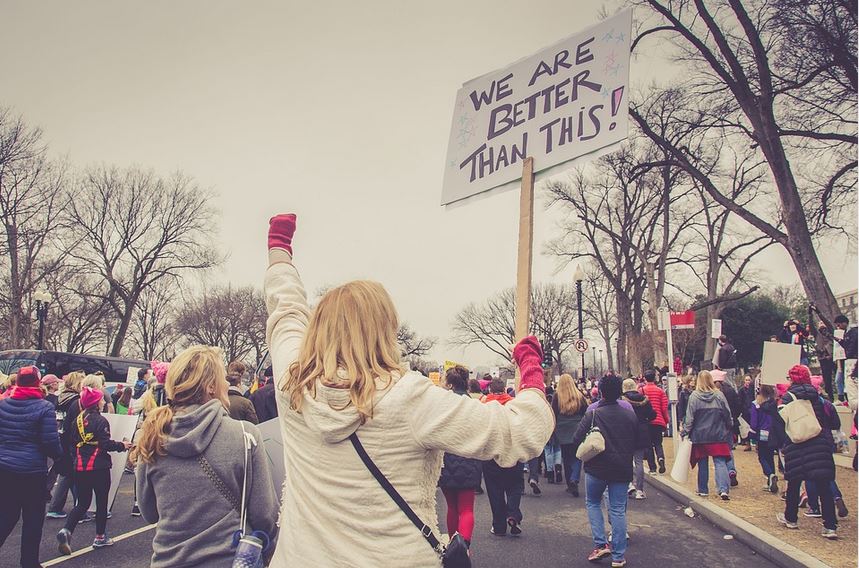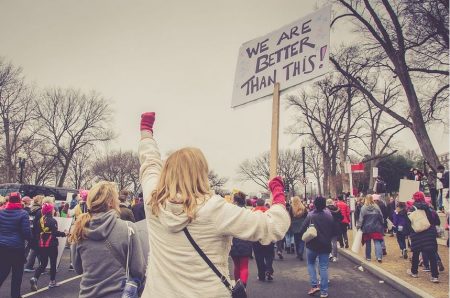by ProfDave, ©2021
(Apr. 22, 2021) — Normally I try to avoid partisanship in these blogs, because not all of my friends are on the same side. Good people may be Republicans or Democrats, Liberals or Progressive Conservatives or NDP or Parti Quebećois, Tories or Laborites – maybe even Communists? But I am concerned about ideas and worldviews. You should vote with your eyes open.
Politics is the art of getting elected, getting legislation through, and getting things done in government. We need good politics to protect us from bad politics. Leadership and statesmanship is about giving direction in public, national, and international affairs. But what direction? Hitler and Stalin were great politicians and leaders, but we disapproved of their methods and the direction in which they led their nations and the world, to put it mildly. Last fall’s election was about more than politics, though both sides tended to obscure the issues in favor of personal attacks. It was about the direction of the nation – who we are and our vision of the future.
Should Christians be involved in politics? New Testament Christians were subject peoples in an Empire. The Emperor was basically a dictator chosen for life by a faraway hereditary Senate. Jesus chose both a patriot and a collaborator as his disciples and told them to “give to Caesar what is Caesar’s and to God what is God’s.” His focus was on grass-roots moral revolution, beginning with the broken: the poor, the sinners, the outcasts. His teachings and his Spirit in the Church turned the Empire and Western Civilization upside down. His early followers lost their public offices and careers because they refused to acknowledge “Caesar is Lord” and participate in civic paganism. But they were good citizens. They weren’t troublemakers, but they obeyed God rather than man, and used whatever status they had to the glory of God. And shed their blood for it. Titus 3:1-2 instructed them to “be subject . . . be obedient . . . be ready to do whatever is good, to slander no one, to be peaceable and considerate” – even under Nero. But that doesn’t mean we have to vote for the incumbent, be silent, or abstain from legal, legislative and constitutional reform and redress. On the contrary, we are called of God to be salt and light in this rotting and darkening world – including politics – to stand up for what is good and right wherever providence has placed us. You have come to citizenship for such a time as this. At least vote your conscience.
Should Christians be involved in politics? No, Christians should not be involved in the name calling, character assassination, double-speak, and mudslinging. We are not to give our souls to any earthly leader or party – Caesar or Empire. We should know better. But good politics is necessary to counteract bad politics, isn’t it? In a democracy, every citizen is responsible for the conduct of the state. Remember Germany 1932? Hitler won, fair and square. Christians who voted for Adolph Hitler – and those who didn’t vote at all – bear responsibility for what they should have known. For not paying attention to the character of the candidate, noting his published worldview, or seeing his vision of Germany’s future – for voting their immediate interests and enthusiasms instead of their Christianity, history has judged them severely.
Christians have a duty to vote and participate and to do so as Christians. Abandoning the leadership of the nation to those without religious and moral convictions would be dereliction of our duty as citizens of earth and representatives of Heaven – not to mention unwise. Especially when faith, family and freedom are under attack. Perhaps you have come to the kingdom (citizenship) for such a time as this? Are you registered?
Should righteous people get involved in politics and government? Should we leave government to the unrighteous? American democracy depends on the participation of all classes in voting, volunteers in running for and holding office, and career judges and administrators. These duties apply to believers and unbelievers alike. No one is excluded by what they believe.
People of integrity should be expected to act according to their convictions in all parts of their life. I have an obligation to vote, and to vote for the good of my country as God gives me to see it. Religious office-holders are sworn to uphold the constitution with integrity, conduct affairs in what they believe is the best interests of all the people, and “rule in the fear of God.” Only a hypocrite leaves his God at the office door. Electing a righteous president does not make a righteous nation, though wicked ones can really foul things up. Great presidents influence the nation, but primarily it is the other way around. We can’t be led in the right direction unless we are willing to go. A righteous nation elects righteous leadership. But it will not happen unless righteous people vote, support candidates and initiatives, and run for office.
Should churches, clergymen and Bishops get involved in politics? No, maybe, and yes. Before becoming President, Lyndon Johnson got involved in a squabble with some churches back in Texas. To solve his problem, he got a law (really an amendment to a tax law) through Congress to threaten the tax-exempt status of all should they endorse candidates. This was dirty pool and questionable constitutionality. A Christian legal organization has been recruiting pastors to challenge it, but the IRS is not taking the bait. Was it a bad law or a good one? Bad: what the government can tax, it can destroy – just the sort of thing the “wall of separation” was supposed to avoid. Good: power is a distraction from the main business of the church. The Johnson law keeps the pulpit at arm’s length from the rough and tumble and limits the temptation for politicians to meddle in church affairs. Clergymen are allowed to speak out on issues and ballot questions, but they should lead candidates rather than following them. In some cases, it rises to an obligation.
On the other hand, it is the business of religion and its spokesman to be the conscience of a civilization – to tell us what is right and wrong and to warn us when we have lost our way.
Churches and clergymen played a vital role in the Revolution and the Civil War, making us the nation that we are. Pastors recruited militias and led them into battle in the Revolution and were prominent in the campaign for the abolition of slavery. They had a prophetic role as the moral and ethical compass of the nation. Protestant clergymen were deeply involved in the politics of social reform in the 19th century. Practically every cause of reform was led by Evangelical clergymen. Revivalism and social reform went hand in hand. The Holiness movement set out to change America. Then came the 20th century.
Something happened in the early 20th century: a schism between the “social gospel” and “fundamentalism.” Liberals went one way and conservatives went the other. The religious left lost its concern for the spiritual transformation of individuals and its Biblical roots while the religious right lost its optimism for the transformation of society and turned inward. My denomination became legalistic and sectarian for a generation or more. We rescued individuals but gave up on society: a holy subculture, relatively withdrawn from the rest of the world. We left it pretty much to black and liberal clergy to lead the civil rights movement. One wing of Christianity was so “in the world” that they lacked a distinctly Christian message and the other so into their own subculture that they ceased to engage “the world.”
With the rise of “the moral majority,” Focus on the Family, the Family Research Council, the late Chuck Colson and others, over the last decades, that has been changing. Evangelicals have become a “special interest group,” but involvement remains controversial among evangelicals and bitterly resented by secularists. The Roman hierarchy has done somewhat better.
Should churches, clergymen and Bishops (also Rabbis, Imams, miscellaneous spiritual leaders and ethicists) get involved in politics? In the 21st century, as in the 19th, we certainly need moral direction. Life, marriage, and religious freedom, like slavery, are moral and ethical issues – not just politics. Pulpits of left and right need to recover their prophetic voice and their rightful place in American society, while retaining their core values in spirit as well as in theory.
Should churches, clergymen and Bishops get involved in politics? Not much choice this year. When directly attacked by an administration or a political campaign, as the Roman Catholic Church, its Bishops, and its service institutions are today, it is only fair to allow them to shoot back! Churches and their teachings were at issue in the last election. Military chaplains are caught in a crossfire. Catholic dogma and Evangelical morality stand directly in the path of the Biden-Harris agenda. Are other people of faith going to stand aside because they see nothing wrong with contraception, chemical abortion and the redefinition of marriage, or stand in solidarity with them (see the Manhattan Declaration) as a matter of religious freedom? There’s going to be some fireworks!
The “wall of separation” has been breached from the state side – big time! Can the state determine what the church can teach? Whether they can practice what they preach? What is right and wrong? Where does your spiritual leader stand? Does it matter?
David W. Heughins (“ProfDave”) is Adjunct Professor of History at Nazarene Bible College. He holds a BA from Eastern Nazarene College and a PhD in history from the University of Minnesota. He is the author of Holiness in 12 Steps (2020). He is a Vietnam veteran and is retired, living with his daughter and three grandchildren in Connecticut.


